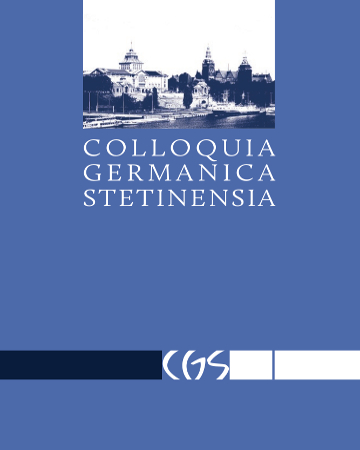







| Authors: |
Barbara
Maj-Malinowska
Politechnika Świętokrzyska |
| Keywords: | (Im)Politeness in the Academic World The Social Role of the University University Research |
| Data publikacji całości: | 2017 |
| Page range: | 17 (203-219) |
| Downloads ?: | 959 |
| 1. | Beck, Peter. Zwischen Identität und Entfremdung. Die Hochschule als Ort gestörter Kommunikation. Frankfurt a. M.: Aspekte–Verlag, 1975. |
| 2. | Birko, Lisa. Der Studenten-Knigge Teil 1: Benimmregeln für den Hörsaal. Zugriff 10.01.2017. https:// www.studenten-pkv.de. |
| 3. | Bonacchi, Silvia. (Un)höflichkeit. Eine kulturologische Analyse Deutsch – Italienisch – Polnisch. Frankfurt a. M.: Peter Lang Verlag, 2013. |
| 4. | Culpeper, Jonathan. Impoliteness: Using Language to cause Offence. Cambridge: Cambridge University Press, 2011. |
| 5. | Definition Soft Skills/ Hard Skills. Außerfachliche Kompetenzen zählen. Zugriff 10.01.2017. https://www.berufsstrategie.de. |
| 6. | Drapińska, Anna. Zarządzanie relacjami na rynku usług edukacyjnych szkół wyższych. Warszawa: Wydawnictwo Naukowe PWN, 2011. |
| 7. | Gruber, Angela. Die Einsamkeit des Professors vor der Laptop-Wand. Zugriff 10.01.2017. https://www.zeit.de. |
| 8. | Gruber, Angela. Werden wir Facebook-Freunde Herr Professor. Zugriff 10.01.2017. https://www.zeit.de. |
| 9. | https: //www.academics.de. Zugriff 10.01.2017. |
| 10. | https://wirtschaftslexikon.gabler.de. Zugriff 10.01.2017. |
| 11. | Kiesendahl. Jana. „‚Guten Abend‘, ‚Gute Nacht‘, ‚Hallöchen‘ und ‚Liebe Grüsse‘. Angemessenheit in studentischen E-Mails“. Aptum. Zeitschrift für Sprachkritik und Sprachkultur 3 (2006): 278–280. |
| 12. | Kiesendahl, Jana. Status und Kommunikation. Ein Vergleich von Sprechhandlungen in universitären E-Mails und Sprechstundengesprächen. Berlin: Erich Schmidt Verlag, 2011. |
| 13. | Kiesendahl, Jana. „Normabweichungen und ihre Wirkungsweisen am Beispiel universitärer E-Mail-Kommunikation“. In: Kommunikation und Öffentlichkeit: Sprachwissenschaftliche Potenziale zwischen Empirie und Norm, hrsg. v. Susanne Günthner, Wolfgang Imo, Dorothee Meer, Jan Georg Schneider, 213–234. Berlin, New York: Walter de Gruyter Verlag 2012. |
| 14. | Knigge für Studenten. Zugriff 10.01.2017. https://www.digiboard.htwk-leipzig.de. |
| 15. | Koper, Anna. Studencki savoir-vivre bez tajemnic. Zugriff 10.01.2017. https://www.radar.up.lublin.pl. |
| 16. | Maj-Malinowska, Barbara. „Savoir vivre an den Hochschulen – Über die Notwendigkeit eines neuen Studienfachs im Angesicht der Herausforderungen des modernen Arbeitsmarktes“. Metodički vidici 7 (2016): 31–44. Zugänglich online unter: http://dx.doi.org/10.19090/mv.2016.7.31-44. |
| 17. | Maj-Malinowska, Barbara. „Dobre wychowanie jako przedmiot akademicki – modny trend czy standard XXI w.?“. Pedagogika XXV/1 (2016): 45–57. Zugänglich online unter: http://dx.doi.org/10.16926/p.2016.25.03. |
| 18. | Maj-Malinowska, Barbara. „Gute Manieren als Studienfach – Zum neuen Trend an vielen Hochschulen im Kontext der steigenden Akademikerzahlen und der Internationalisierung – ein deutsch-polnischer Erfahrungsvergleich“. Studia Niemcoznawcze LVII (2016): 643–654. |
| 19. | Ostafińska-Molik, Barbara. „Studenci – dziś i wczoraj. Refleksja o etosie“. In: Student na współczesnym uniwersytecie. Ideały i codzienność, hrsg. v. Dorota Pauluk, 175–186. Kraków: Oficyna Wydawnicza Impuls, 2010. |
| 20. | Pauluk, Dorota. „Uniwersytet Jagielloński w percepcji studentów. Sprawozdanie z badań“. In: Student na współczesnym uniwersytecie. Ideały i codzienność, hrsg. v. Dorota Pauluk, 255–268. Kraków: Oficyna Wydawnicza Impuls, 2010. |
| 21. | Sajdak, Anna. Paradygmaty kształcenia studentów i wspierania rozwoju nauczycieli akademickich. Teoretyczne podstawy dydaktyki akademickiej. Kraków: Oficyna Wydawnicza Impuls, 2013. |
| 22. | Szczęk, Joanna. „‚Kochany Panie Dziekanie‘ – o przekraczaniu norm w podaniach studenckich“. In: Norma a komunikacja, hrsg. v. Magdalena Steciąg, Marian Bugajski, 131–138. Wrocław: Oficyna Wydawnicza ATUT, 2009. |
| 23. | Szczęk, Joanna. „‚Przepraszam za kłopot jaki stanowi moja osoba‘ – formy grzeczności w podaniach studenckich“. In: Z zagadnień semantyki i stylistyki tekstu, hrsg. v. Anna Ginter, 389–395. Łódź: Wydawnictwo Uniwersytetu Łódzkiego, 2010. |
| 24. | Wawak, Tadeusz (Hg.). Wyzwania zarządzania jakością w szkołach wyższych. Kraków: Wydawnictwo Uniwersytetu Jagiellońskiego, 2011. |
| 25. | Wiesmann, Bettina. Mündliche Kommunikation im Studium. Diskursanalysen von Lehrveranstaltungen und Konzeptualisierung der Sprachqualifizierung ausländischer Studienbewerber. München: Iudicium Verlag, 1999. |
| 26. | Wittmann,Christoph. Benimmregeln für Studis. Zugriff 10.01.2017. https://www.br.de. |
| 27. | XYZ – Generationen auf dem Arbeitsmarkt. Zugriff 10.01.2017. https://www.absolventa.de. |
| 28. | Zarend, Anna. Höflichkeit in der interkulturellen Kommunikation Russisch-Deutsch. Sprechwissenschaftliche Untersuchungen zum Höflichkeitsgrad in telefonischen Servicegesprächen. Berlin: Frank & Timme, 2015. |